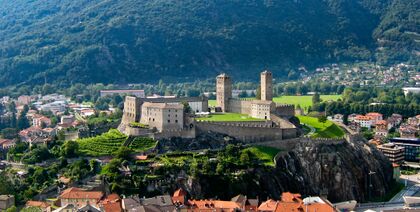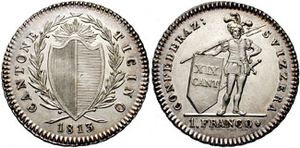تيتشينو
| جمهورية وكانتون تيتشينو Repubblica e Cantone Ticino | |||
| |||

| |||
| الأحداثيات | 46°19′N 8°49′E / 46.317°N 8.817°E | ||
| العاصمة | بلينزونا | ||
| Largest city | Lugano | ||
| عدد السكان | 328٬580 [1] | ||
| - الكثافة | 117 /km² (303 /sq mi) | ||
| المساحة | 2٬812 كم² (1٬086 م. م.) | ||
| أعلى نقطة | 3,402 m (11,161 ft) - Adula (Rheinwaldhorn) | ||
| أوطى نقطة | 195 m (640 ft) - Lake Maggiore | ||
| Joined | 1803 | ||
| الاختصار | TI | ||
| اللغات | الايطالية | ||
| التنفيذية | Consiglio di Stato (5) | ||
| التشريعية | Gran Consiglio (90) | ||
| البلديات | 176 municipalities | ||
| Districts | 8 distretti | ||
| الموقع الإلكتروين | TI.ch | ||
كانتون تيتشينو أو تيتشينو (النطق بالإيطالية: [tiˈtʃiːno]; ألمانية: Tessin [teˈsiːn]; انظر أيضا أسماء أخرى)، هوكانتون يقع في أقصى جنوب سويسرا.وقد سمي على اسمنهر تيتشينو، وهو الكانتون الوحيد في سويسرا، الذي به لغة رسمية واحدة وهي اللغة الإيطالية.
Ticino ( /tᵻˈtʃiːnoʊ/), sometimes Tessin ( /tɛˈsiːn,_tɛˈsæ̃/), officially[2] the Republic and Canton of Ticino or less formally the Canton of Ticino,[أ] is one of the 26 cantons forming the Swiss Confederation. It is composed of eight districts and its capital city is Bellinzona. It is also traditionally divided into the Sopraceneri and the Sottoceneri, respectively north and south of Monte Ceneri. Red and blue are the colours of its flag.
Ticino is the southernmost canton of Switzerland. It is one of the three large southern Alpine cantons, along with Valais and the Grisons. However, unlike all other cantons, it lies almost entirely south of the Alps. Through the main crest of the Gotthard and adjacent mountain ranges, it borders the canton of Valais to the northwest, the canton of Uri to the north and the canton of Grisons to the northeast; the latter canton being also the only one to share some borders with Ticino at the level of the plains. The canton shares international borders with Italy as well, including a small Italian enclave.
Named after the Ticino, its longest river, it is the only canton where Italian is the sole official language and represents the bulk of the Italian-speaking area of Switzerland along with the southern parts of the Grisons. In قالب:Swiss populations data CH-TI, Ticino had a population of قالب:Swiss populations data CH-TI.قالب:Swiss populations data CH-TI The largest city is Lugano and the two other notable centres are Bellinzona and Locarno. The canton is a major tourist destination and is renowned for its distinct culture and gastronomy, and also for its warmer climate, especially around Lake Maggiore and Lake Lugano.
The land now occupied by the canton was annexed from Italian cities in the 15th century by various Swiss forces in the last transalpine campaigns of the Old Swiss Confederacy. In the Helvetic Republic, established 1798, it was divided between the two new cantons of Bellinzona and Lugano. The creation of the Swiss Confederation in 1803 saw these two cantons combine to form the modern canton of Ticino. Because of its unusual position, the canton relies on important infrastructures for connections with the rest of the country. The first major north-south railway link, the Gotthard Railway, opened in 1882. In 2016, the Gotthard Base Tunnel, the first flat route through the Alps, was inaugurated.
. . . . . . . . . . . . . . . . . . . . . . . . . . . . . . . . . . . . . . . . . . . . . . . . . . . . . . . . . . . . . . . . . . . . . . . . . . . . . . . . . . . . . . . . . . . . . . . . . . . . . . . . . . . . . . . . . . . . . . . . . . . . . . . . . . . . . . . . . . . . . . . . . . . . . . . . . . . . . . . . . . . . . . . .
أصل الاسم
The name Ticino was chosen for the newly established canton in 1803, after the river Ticino which flows through it from the Novena Pass to Lake Maggiore.[3]
Known as Ticinus in Roman times, the river appears on the Tabula Peutingeriana as Ticenum. Johann Kaspar Zeuss attributed Celtic origins to the name, tracing it to the Celtic tek, itself from an Indo-European root tak, meaning "melting, flowing".[4]
The official name of the canton is Republic and Canton of Ticino (إيطالية: Repubblica e Cantone Ticino) and the two-letter code is TI. It is one of the four cantons of Switzerland officially referred to as "republics", along with Geneva, Neuchâtel and Jura.
التاريخ

In ancient times, the area of what is today Ticino was settled by the Lepontii, a Celtic tribe. Later, probably around the rule of Augustus, it became part of the Roman Empire. After the fall of the Western Empire, it was ruled by the Ostrogoths, the Lombards and the Franks. Around 1100 it was the centre of struggle between the free communes of Milan and Como: in the 14th century it was acquired by the Visconti, Dukes of Milan. In the fifteenth century the Swiss Confederates conquered the valleys south of the Alps in three separate conquests.
Between 1403 and 1422 some of these lands were already annexed by forces from the canton of Uri, but subsequently lost. Uri conquered the Leventina Valley in 1440.[5] In a second conquest Uri, Schwyz and Nidwalden gained the town of Bellinzona and the Riviera in 1500.[5] Some of the land and Bellinzona itself were previously annexed by Uri in 1419 but lost again in 1422. The third conquest was fought by troops from the entire Confederation (at that time constituted by 12 cantons). In 1512 Locarno, the Maggia Valley, Lugano and Mendrisio were annexed. Subsequently, the upper valley of the river Ticino, from the St. Gotthard to the town of Biasca (Leventina Valley) was part of Uri. The remaining territory (Baliaggi Ultramontani, Ennetbergische Vogteien, the Bailiwicks Beyond the Mountains) was administered by the Twelve Cantons. These districts were governed by bailiffs holding office for two years and purchasing it from the members of the League.[5]
الجغرافيا

الحكومة

التقسيمات السياسية
الأحياء
ينقسم كانتون تيتشينو إلى 8 أحياء:
- بلينزونا وعاصمته بليزنونا
- Blenio with capital Acquarossa
- Leventina with capital Faido
- Locarno with capital Locarno
- Lugano with capital Lugano
- Mendrisio with capital Mendrisio
- Riviera with capital Biasca
- Vallemaggia with capital Cevio
البلديات
يتكون كانتون تيتشينو من 176 بلدية (as of April 2009[تحديث]).
الديموغرافيا

الاقتصاد
النقل
. . . . . . . . . . . . . . . . . . . . . . . . . . . . . . . . . . . . . . . . . . . . . . . . . . . . . . . . . . . . . . . . . . . . . . . . . . . . . . . . . . . . . . . . . . . . . . . . . . . . . . . . . . . . . . . . . . . . . . . . . . . . . . . . . . . . . . . . . . . . . . . . . . . . . . . . . . . . . . . . . . . . . . . .
التعليم
الثقافة
انظر أيضا
المصادر
- ^ خطأ استشهاد: وسم
<ref>غير صحيح؛ لا نص تم توفيره للمراجع المسماةBFS Tessin - ^ Il Ticino in breve, ti.ch (official website of the canton). Retrieved 2021-01-25. ("Ticino is officially called the Republic and Canton of Ticino, its official language is Italian and its capital is Bellinzona")
- ^ "Lo scorrere del fiume, l'opera dell'uomo". Azienda elettrica ticinese. Archived from the original on 28 October 2014. Retrieved 28 October 2014.
- ^ Roberto Rampoldi (1901). "Intorno all'origine e al significato del nome Ticino". Internet Archive. Retrieved 28 October 2014.
- ^ أ ب ت Coolidge 1911, p. 934.
- ^ خطأ استشهاد: وسم
<ref>غير صحيح؛ لا نص تم توفيره للمراجع المسماةalpt
بيبليوگرافيا
- Marcello Sorce Keller,“Canton Ticino: una identità musicale?”, Cenobio, LII(2003), April-June, pp. 171-184; also later published in Bulletin - Schweizerische Gesellschaft für Musikethnologie und Gesellschaft für die Volksmusik in der Schweiz, October 2005, pp. 30-37.
وصلات خارجية
| Canton of Ticino
]].- Cantone Ticino (Italian) official site
- Ticino Tourism office, official website
- Ticino 360° Fullscreen panoramic images
- Photos of San Francisco photographer JB Monaco's 1908 pilgrimage to Ticino
![]() سويسرا
Ticino:Ticino
سويسرا
Ticino:Ticino
خطأ استشهاد: وسوم <ref> موجودة لمجموعة اسمها "lower-alpha"، ولكن لم يتم العثور على وسم <references group="lower-alpha"/>
- Pages using gadget WikiMiniAtlas
- Articles with hatnote templates targeting a nonexistent page
- Coordinates on Wikidata
- Articles containing ألمانية-language text
- Pages using Lang-xx templates
- Articles containing إيطالية-language text
- مقالات فيها عبارات متقادمة منذ 2009
- جميع المقالات التي فيها عبارات متقادمة
- تيتشينو
- كانتونات سويسرا





